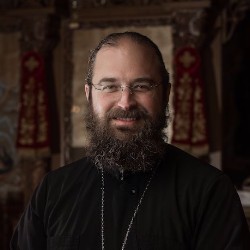On this Sunday, the fifth Sunday of Luke, our Gospel reading comes from the second half of Luke chapter 16. However, Fr. Gregory starts with the parable in the first half of the chapter.
At the beginning of the chapter, Luke indicates Jesus was speaking to the Pharisees, who were “lovers of money.” He gives them the parable of the unjust steward, in which the steward lowers the debts of his master’s debtors. Interestingly, the master commends the steward because of his shrewdness. Fr. Gregory explains that this parable shows us the way in which we are to use our earthly money and possessions for our eternal benefit.
The parable that follows is the parable of the rich man and Lazarus. The rich man was “clothed in purple and fine linen and fared sumptuously each day,” and Lazarus was a beggar at his gate. After both men died, Lazarus was at Abraham’s side while the rich man was in Hades. The rich man asked Abraham to send Lazarus to his family in order to warn them of what was to come, but Abraham, who even had mercy on the wicked city of Sodom, could not have mercy on the rich man.
Fr. Gregory then relates this parable to the story of St. Makarios of Egypt, who found a skull in the desert, tapped on it and asked “Who are you?” It was a pagan priest condemned to hell who said that they were all bound with their backs to each other, and that their greatest punishment was not being able to see each other’s faces. In this story, we see the danger of being indifferent to seeing the faces of others—the poor, our neighbors, and other church members.
Relating this story back to the parable of the rich man, Fr. Gregory points out that God respects our choices here in this life and makes them permanent in the next. Fr. Gregory also points out that there is no record of the rich man committing sins such as adultery or murder. Rather, there is only the sin of the good that is left undone, the sin that comes when we ignore the faces of those in need.
Finally, Fr. Gregory reminds us that all we have has been given by God, and we are simply His stewards. We must be shrewd stewards, not foolish like the rich man, and we must not leave the good left undone.
